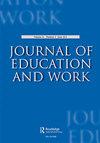The uneven earnings benefits for men and women of skills acquisition in a virtual university
IF 1.7
Q2 EDUCATION & EDUCATIONAL RESEARCH
引用次数: 0
Abstract
ABSTRACT Using multivariate linear regression models, this study estimates the relationship between graduates’ self-reported skill improvements from attending a virtual university, the Open University of Catalonia (UOC), and their salaries after obtaining the degree. Our results show that graduates made considerable earnings gains and especially high rates of return to investing in a Master’s degree. Reported earnings by male and female UOC students are 31% and 18% higher than their gender-age counterparts to university graduates in the Spanish labour market. They also benefited from unintended returns in terms of enhanced digital skills, even among graduates who were not enrolled in ICT-related degrees. The improvement they reported in these skills contributed to earnings gains, but only for males. As such, acquiring digital skills for women seems to have little impact on how much they are rewarded in the labour market. This suggests that the types of jobs held by women in Catalonia probably do not specifically reward digital skills. Since UOC graduates are generally older and employed during their studies, the gains made by women may be more related to the fact that they obtained a degree that led to a promotion rather than any specific skills acquired in their studies.虚拟大学中获得技能的男性和女性的收入收益不均衡
摘要:本研究采用多元线性回归模型,估计了虚拟大学加泰罗尼亚开放大学(UOC)毕业生自我报告的技能提高与他们获得学位后的工资之间的关系。我们的研究结果表明,毕业生获得了可观的收入增长,特别是投资硕士学位的回报率很高。在西班牙劳动力市场上,UOC男女学生的报告收入分别比同龄大学毕业生高出31%和18%。他们还从提高数字技能方面的意外回报中受益,即使是那些没有就读信息通信技术相关学位的毕业生也是如此。他们报告的这些技能的提高有助于收入的增加,但仅适用于男性。因此,女性获得数字技能似乎对她们在劳动力市场上获得多少回报影响不大。这表明,加泰罗尼亚女性从事的工作类型可能不会特别奖励数字技能。由于UOC的毕业生通常年龄较大,并且在学习期间就业,因此女性获得的收益可能更多地与她们获得的学位有关,而不是与她们在学习中获得的任何特定技能有关。
本文章由计算机程序翻译,如有差异,请以英文原文为准。
求助全文
约1分钟内获得全文
求助全文
来源期刊

Journal of Education and Work
EDUCATION & EDUCATIONAL RESEARCH-
CiteScore
2.70
自引率
14.30%
发文量
40
期刊介绍:
The Journal of Education and Work is an international forum for academic research and policy analysis which focuses on the interplay of the education and economic systems. The journal examines how knowledge, skills, values and attitudes both about and for work and employment are developed within the education system. The journal also explores the various forms of industrial training and accreditation in the economic system, including changes in the economic and industrial infrastructure which influence the type of employees required. Work in the informal economy is also included.
 求助内容:
求助内容: 应助结果提醒方式:
应助结果提醒方式:


